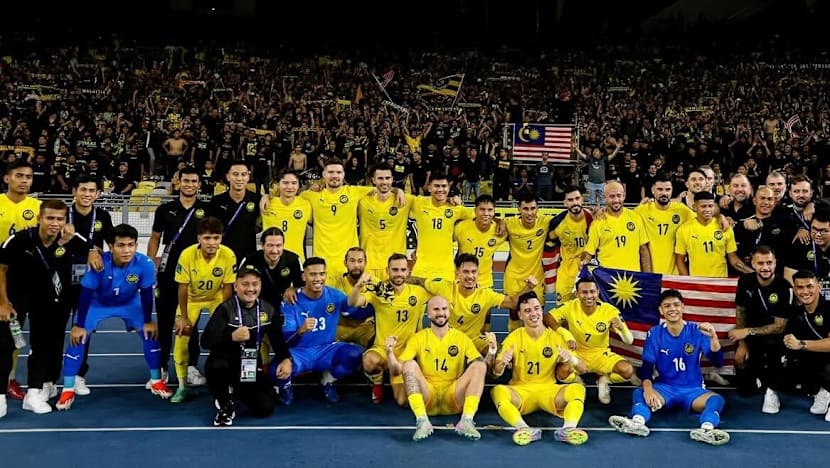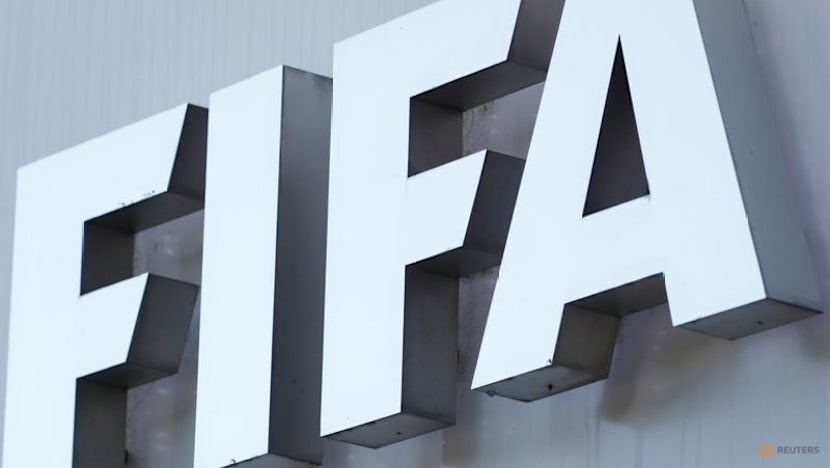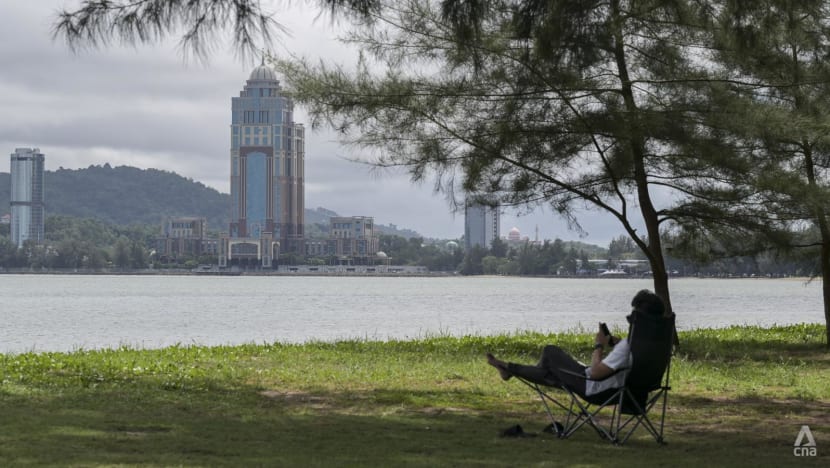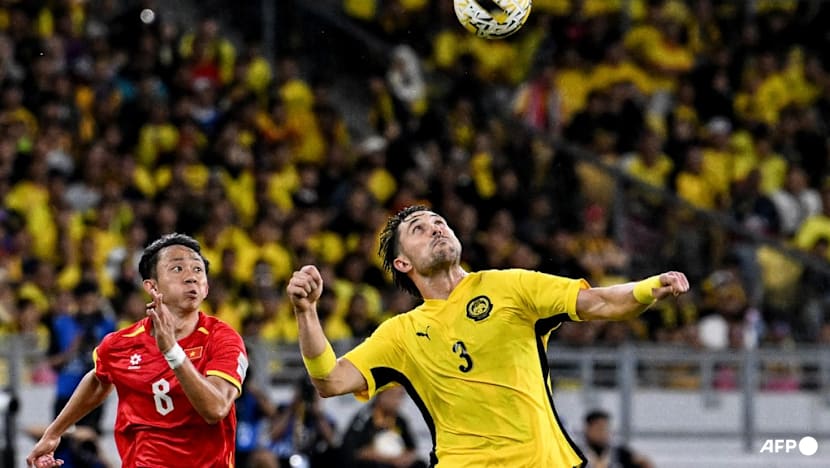analysis Asia
FIFA’s fraud findings go beyond football scandal, with political ramifications for Malaysia
Citizenship has long been a contentious issue in Malaysia.


This audio is generated by an AI tool.
KUALA LUMPUR: The document fraud scandal rocking Malaysian football over the country’s fielding of ineligible foreign-born players is turning the heat on Prime Minister Anwar Ibrahim’s government over its granting of citizenship that has long been a contentious issue in Malaysia.
The scandal, which led to world football governing body FIFA slapping Malaysia’s football association with a 350,000 Swiss franc (US$437,000) fine and banning seven foreign-born players who became naturalised citizens and represented the country, has prompted calls from the opposition for a Royal Commission of Inquiry (RCI) into the affair.
Takiyuddin Hassan, the chief Parliament whip for the opposition Perikatan Nasional coalition, said this week that the scandal went beyond “routine administrative errors”.
“This is not a technical mistake, but a deliberate act of fraud,” he said.
“The roles of JPN, the Ministry of Home Affairs, and the Ministry of Youth and Sports must also be examined, including any potential elements of corruption, abuse of power, or political interference,” he added, referring to the National Registration Department (JPN).
Apart from an RCI into the matter, elected parliamentary representatives from Anwar’s own Pakatan Harapan coalition are insisting the Parliament debate the widening football scandal.
Football has a huge following in Malaysia and the unprecedented actions against the country, which has been a FIFA member since 1956, has put the Anwar government and the Football Association of Malaysia (FAM), the sports government body, on the backfoot.
When the scandal erupted on Sep 26 after FIFA announced its sanctions against Malaysia, Home Affairs Minister Saifuddin Nasution Ismail told CNA that all foreign players were granted citizenship after a very rigorous process.
“They were given warganegara (citizenship in Malay) under the constitution. As far as the government is concerned, everything is in order based on the documents provided,” he said, adding that this was a matter between the FAM and FIFA.
On Thursday (Oct 9), Saifuddin reiterated in Parliament that all provisions in the Constitution were followed in the granting of citizenships to the seven foreign players.
“The matter of their eligibility to play is something between FIFA and FAM,” he said.
He did not respond to a fresh request from CNA for comment on how the government plans to deal with FIFA’s findings of forged birth certificates.
In its ground of decision released on Oct 6, FIFA said that the FAM and players used forged or falsified birth certificates of the players’ grandparents to secure their eligibility to play for the national team.
FIFA said such conduct “constitutes, pure and simple, a form of cheating, which cannot in any way be condoned”.
NOT GOING AWAY
Sports commentators, lawyers and executives from sporting associations, including the Asian Football Confederation (AFC), have noted that FIFA’s assertions of Malaysia’s wrongdoings suggest that the controversy over the drafting of foreign players is not going away anytime soon.
“FIFA is very comprehensive and when it slaps sanctions based on forgery and falsification of documents (it) means that the body has very strong proof to back up its claims,” said Frankie D’Cruz, one of Malaysia’s most established sports journalists who writes regular commentaries on governance and athletes’ welfare.
“The real question here is how much was the government aware about what went on in the naturalisation and drafting of foreign players under the heritage players’ arrangement,” he told CNA.

In a country where divisions over race and religion shape national politics, football has been a rare unifying force, particularly among younger Malaysians who are considered a crucial electoral voting block.
The latest scandal over Malaysia’s cavorting with foreign talent as a quick fix to capture football glory has incensed the domestic football community, noted analysts, citing the virulent comments and chatter on social media.
“The current situation is not just an administrative setback; it is a moral and governance crisis,” said sports commentator Christopher Raj, a former FAM executive member who has also served as media officer for FIFA.
“FAM must act now – decisively and openly – to prove that Malaysian football can rise from this embarrassment stronger and more credible than before.”
TROUBLING POLITICAL TANGENT
What’s more, the embarrassing turn of events is beginning to lurch onto a potentially troubling political tangent.
Malaysia has one of the region’s most stringent requirements for conferring citizenship, that in turn has led to huge debates over the high numbers of statelessness for foundlings and children born to unmarried mothers.
Home Minister Saifuddin told Parliament on Thursday that his ministry had received 49,000 citizen applications for citizenship, with 6,000 cases still pending.
He added that a total of 23 foreign football players, including the seven sanctioned ones, have received citizenship since 2018.
How the seven foreign footballers, hailing from Brazil, the Netherlands, Spain and Argentina, obtained their status as citizens, has put Anwar in an awkward spot, particularly ahead of a crucial state assembly election in the East Malaysian state of Sabah.
The issue of citizenship in Sabah, where Christians make up about 25 per cent of the population, is particularly sensitive.

Politics in the state has long been a mix of bloody demonstrations and clashes among the different ethnic groups and long-established tribal communities known as Kadazans.
Many Sabahans still view Anwar with distrust, according to political analysts in the state which dissolved its state assembly this week ahead of fresh polls that must be held in the next 60 days.
That’s because when he served as former premier Mahathir Mohamad’s deputy in government from 1993 to 1998, Anwar was alleged to have been involved in covert operations to alter the demographics of the state by issuing citizenships to illegal Muslim refugees from the neighbouring islands of southern Philippines and Indonesia.
The ensuing naturalisation of migrant communities that became citizens very much overnight in a scandal known as Project IC (or Project Identity Card) is widely deemed to have significantly diluted the political clout of Kadazan Sabahans in favour of Muslim communities, keeping the state’s political landscape on edge.
“The scars from Project IC are still fresh with many Sabahans and citizenship could become an electoral issue because it goes to show that this has long been a political tool,” said a senior politician from Parti Bersatu Sabah, a Kadazan-dominated party who requested not to be named.
WHAT GOT MALAYSIAN FOOTBALL HERE
In the 1970s and early 1980s, the Malaysian national football team ranked as one of the best in Asia, often beating rivals from South Korea and Japan that are today considered world class soccer teams.
But the downward spiral was quick.
In the early 1990s, the domestic football ecosystem was rocked by scandals of match-fixing by illegal gambling bookies. Over 100 players and coaches were investigated for match fixing, leading to bans and punishments.
The crackdown on the widespread rigging failed to stamp out the shenanigans between players and coaches together with bookies, and the slump in Malaysian football persisted.
Spectacular low points include the humiliating 10-0 drubbing of the Malaysian football team by the United Arab Emirates in 2015 and the slumping of the country’s FIFA’s world ranking to its lowest level of 168 three years later.
Glimmers of turnaround in Malaysia’s football fortunes began to take shape about five years ago.
The country’s FIFA world rankings began to slowly recover, rising to the mid-130 range before moving to a recent best of 123rd spot in the global standing in September this year.
Central to all of this has been Malaysia’s aggressive courting of foreign talent under FIFA’s naturalisation rules.
It is a process that allows foreign sportsmen, or so-called “heritage players”, to change their sporting nationality to play for a new national team under conditions of long-term residency or ancestral lineage.
The big promoter of the heritage player programme in Malaysia is also the sport’s most visible campaigner: The crown prince of Johor, Tunku Ismail Sultan Ibrahim, who is also the son of Malaysia’s current King.
In January, Tunku Ismail, who once served as FAM president, declared on social media that “6-7 heritage players” have been identified, expressing hope the government could assist in the process of obtaining Malaysian passports in order for them to play in the Asian Cup 2027 qualifiers.
He did not name the players or say what countries they were from, but added that it is “crucial” for the team to start the qualification campaign with positive results.
Under current rules, national associations such as the FAM must submit proof of nationality of a foreigner through birth, descent or a process of lawful naturalisation established in member countries. Supporting documents must include genuine passports, birth certificates and proof of parental birth in the country.
By June this year, seven players from Brazil, the Netherlands, Spain and Argentina were naturalised and were drafted to the national team known as Harimau Malaysia (Malaysian Tigers).

All seven - Gabriel Palmero, Facundo Garces, Rodrigo Holgado, Imanol Machuca, Joao Figueiredo, Jon Irazabal and Hector Hevel - played in an Asian Cup qualifying match on Jun 10 against Vietnam, with two of them scoring in the 4-0 win.
Shortly after, what appeared to be a new high point in Malaysian football began to turn dark following a complaint to FIFA that officially questioned the eligibility of the seven players to represent Malaysia, according to regional football executives.
Sources told CNA that the complaint came from a Southeast Asia country.
The bombshell came on Sep 26 when FIFA declared that an investigation had found that FAM had “used doctored documentation to be able to field” the seven foreign players.
Apart from the fine on the FAM, the seven players have been slapped with a 12-month ban from football, triggering a national scandal in Malaysia.
FAM’S NEXT MOVES
FAM, which received the full grounds of FIFA’s decision this week, said it will lodge an appeal in the coming days against the decision by the world football body, which it claimed was “inaccurate and unfounded”.
According to senior executives involved in the AFC, FIFA’s affiliate that is also the regional governing body for the sport, FAM’s appeal will go before the world body’s appeals tribunal.
The tribunal typically does not overturn decisions made by FIFA, and should Malaysia remain unsatisfied, the FAM can file an appeal to the Court of Arbitration for Sport (CAS), an international independent tribunal represented by lawyers and retired judges that acts as the final arbiter for football disputes.
Regional sporting officials noted that going before the CAS could be a risky gambit.
“In 2024, the CAS upheld 89.5 per cent of FIFA’s decision in cases that came before the tribunal, and the problem is that Malaysia will only then be aware of the full extent of the material and proof that went behind the original decision,” said sports commentator Raj.
He added that the prospect of sanctions being enhanced cannot be ruled out.
Malaysia’s troubles are not expected to end even after any appeals process with the FIFA tribunal and CAS that could stretch to late December.
There could still be action against Malaysia from the AFC, which has stated that it will only begin its own probes into the matter of fielding ineligible foreign players after the disciplinary process with FIFA is completed.
Should an investigation by AFC, which runs the Asian Cup, confirms Malaysia’s guilt, the country could be disqualified from participating in the 2027 Asian Cup.


















